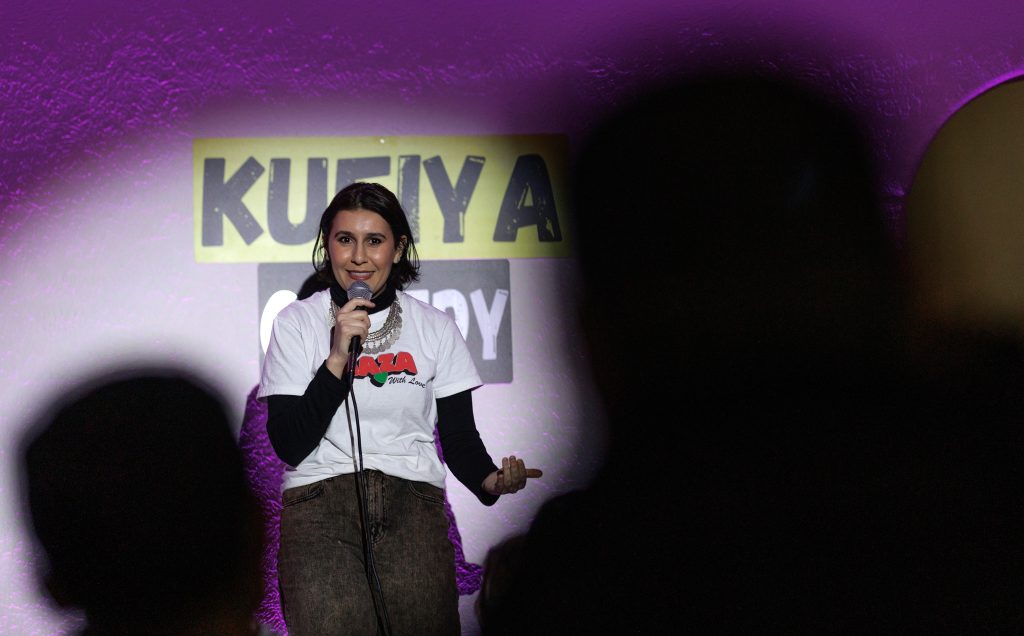
Once a month on Saturday nights, Marena Riyad hosts a stand-up comedy showcase, Kufiya Comedy, at her Lemmon Avenue salon, the Haus of Henna. Nathan Hunsinger / Dallas Morning News
In her salon, Marena Riyad was seated close to her customer, Kami Harris, bent over the woman’s bare arm and shoulder. Riyad, who owns the Haus of Henna, was carefully applying to Harris’ skin a dark, paisley-like design, an intricate tracery of flowers and feathers.
Riyad, 31, opened the Haus of Henna only eight months ago, but before that, she worked out of a tiny studio. So she already has repeat customers like Harris.
“She’s got plenty of clients,” said Harris, who’s in her forties and lives in Dallas. “I get stopped all the time. ‘Oh my God, where did you get that?'”
What Riyad was applying to Harris’ skin in this instance was not henna. It was jagua.
Both henna and jagua are temporary dyes used to stain human skin. Henna is the reddish-brown dye you probably know. Jagua is often called “black henna,” but that’s a misnomer, Riyad explained. What’s often sold as “black henna” contains commercial chemicals, while actual jagua is more blue-black, and, like real henna, it’s plant-based.
Riyad delivered all these details rapid-fire. Correcting popular misconceptions, sharing information: It’s like Riyad grew up immersed in henna, leaving her eager to make this deeply-held family tradition better understood.
Well, no. Actually, Riyad taught herself all this. As for her immigrant Palestinian family, they own three pizzerias.
“The reason I share this,” Riyad said, “is that people romanticize Eastern culture a lot. I just saw an opportunity to do something that I love.”
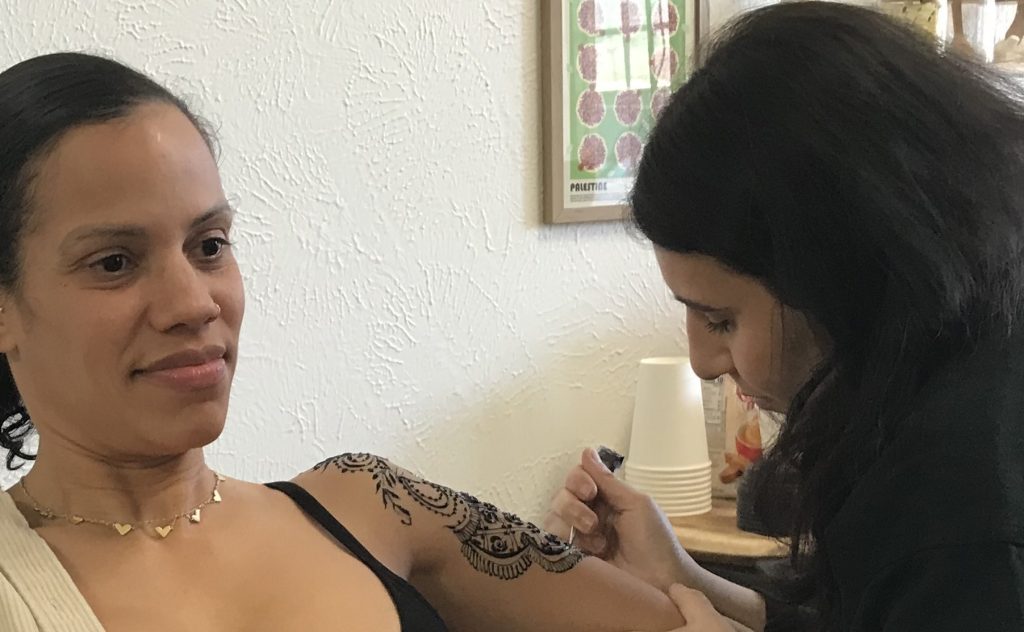
Marena Riyad applying jaqua – a plant dye like henna only blue-black instead of reddish-brown – to customer Kami Harris. Jerome Weeks / KERA News
Which, she quipped, is “not to show up to work early in the morning.”
And that is true: Nights are often very different for Riyad.
On a Saturday evening in January, Riyad stepped out on a little stage near the back of her salon. Instead of a single customer, some two dozen people crowded the place.
“We have such a special show for you tonight,” she said, playing the host. “I’m going to do a little bit of time myself — because I’m a comedian.”
An audience member giggled.
Riyad was quick: “Thank you, thank you.”
Another chuckle.
“Oh, she’s been here before,” Riyad explained. “I hire her to come out to every show.”
A comedy lab
On these Saturday nights, Riyad turns her salon into the Kufiya Comedy Show. The kufiya (or keffiyeh) is the traditional checkered scarf that’s worn throughout the Arab world. But in recent decades, it’s become, in particular, a symbol for Palestinian nationalism.
Riyad grew up in a refugee camp in the Israeli-occupied West Bank — until her parents moved her and her siblings to Texas. She was 10.
“So I grew up in two Third World countries,” Riyad told the audience. “Palestine and East Texas.”
People laughed. She promptly asked, grinning, “OK, which one are you laughing at? Because you’d better not be calling my homeland a Third World country.”
Kufiya Comedy typically draws an audience that is almost entirely Middle Eastern, African American and Asian American.
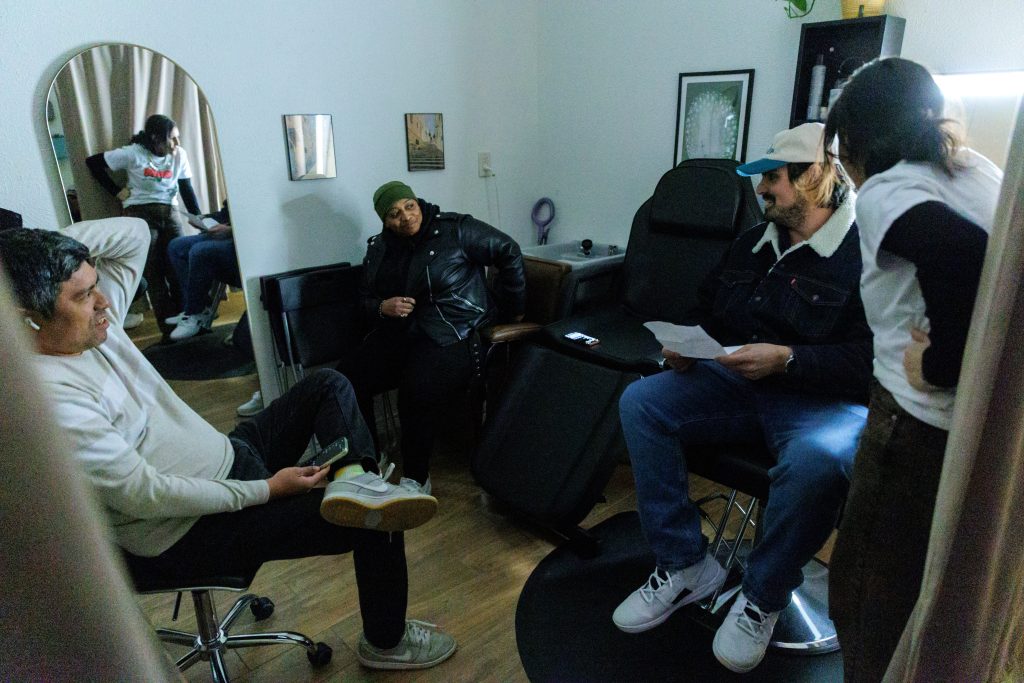
Backstage at Kufiya Comedy (left to right): David Diaz, Marena Riyad (in mirror), KaLenna Spiller, Mohamed Mercy and Riyad. Nathan Hunsinger / Dallas Morning News
And the line-up of comedians was almost as diverse: In addition to Riyad, who’s Muslim, there was a Latino man, David Diaz; an African-American man, BJ Cramer; a self-identified Black lesbian, KeLanna Spiller; and a Muslim Jordanian, Mohamed Mercy.
A major reason some comics, especially ones starting out, might want to appear here, as small as it is: Riyad gives them 15 minutes of stage time. At most comedy clubs, they get five. Which means here, they can try out new material.
So Kufiya Comedy is a tiny, multicultural hub in North Texas. And it’s something of a comedy lab, a training ground.
Lauren Rose Brown was in the audience. She’s in her 30s and works at the University of Texas at Dallas, and she’s seen Riyad several times.
“She highlights, like, femme comics, non-binary, queer, different races, too,” Brown said. “Like people you normally don’t get to hear their voices in comedy. So I like her mixing it up for everyone.”
“The purpose of the comedy show,” Riyad said, “is to bring people that typically don’t go to comedy into a space that’s more welcoming, to bring comedy and community together. I’m often the only Palestinian or Arab on the line-up, but thirty-three percent of our audience is Arab American.
“That’s why it’s called ‘kufiya.’ That’s like a Bat Signal [to Arab Americans],” she said. “When they see that, they know this is a safe space for them.”
Three different audience members confirmed: The word “kufiya” on a flyer or a poster was what caught their eye and made them curious. Kufiya? Arabs or Muslims doing stand-up?
In Dallas?
But if all that’s true — if performing like this, running this kind of comedy show, is really where Riyad’s heart is — then why the henna salon?
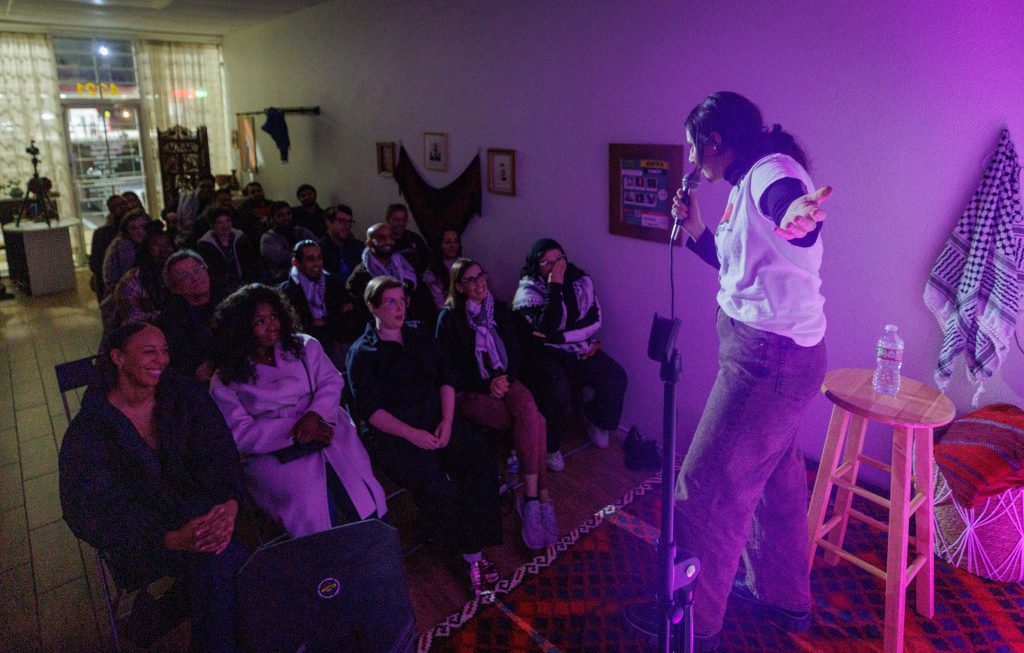
Marena Riyad performing at Kufiya Comedy. Her henna salon can hold almost three dozen people. But it was a freezing Saturday (note the coats and scarves), so only two dozen attended this evening. Nathan Hunsinger / Dallas Morning News
Riyad said she studied both business and art (including acting) at the University of North Texas. She was determined to be a “non-starving artist.”
After graduating in 2016, she met a young woman who knew how to do henna. So Riyad drew up a business plan. A henna salon, Riyad explained, made sense as a start-up for someone without much money. It has low entry costs and a high return on investment — especially when one of the two of them already knew the artsy-technical side of things.
Then the young woman joined the military.
So Riyad set out to teach herself everything she could about henna.
Punchlines, then pizza
Riyad has been doing stand-up since 2018. “I cannot emphasize enough how I did not know anything about the stand-up world,” she said. Not in her culture, not in her background, not in her education. But she took to it, she said: “All I’ve done is tell my story.”
But then came the salon – which, she eventually realized, could be a place for her to do stand-up.
The “kufiya” nature of Kufiya Comedy extends to more than just the jokes or the audience members. Sharing food is a baseline gesture of hospitality in the Middle East, and during the show, Riyad invited everyone to join her afterwards for appetizers a block away at Mondo Pizza.
The food is halal, she added, meaning it follows Islamic dietary laws.
Most of the comics showed up, as did half the audience. Ameer Wahdan, 34, is Palestinian, a martial-arts instructor and a fan of stand-up. Tonight’s comics impressed him — as did this gathering.
“I really like the communal aspect of everyone sitting down and eating and just getting to know each other,” he said. “Honestly, it’s not just a Middle Eastern thing, I would say it’s like a rest-of-the-world thing. You know, I think it’s only America where that’s not part of our social structure.”
A henna salon that morphs into a stand-up club is unusual enough — as is a comedy club that draws this kind of audience in Texas, and then feeds them. Riyad said she has felt a little split, keeping henna and stand-up separate, like day and night (“Who’s ever met a stand-up in daylight?”).
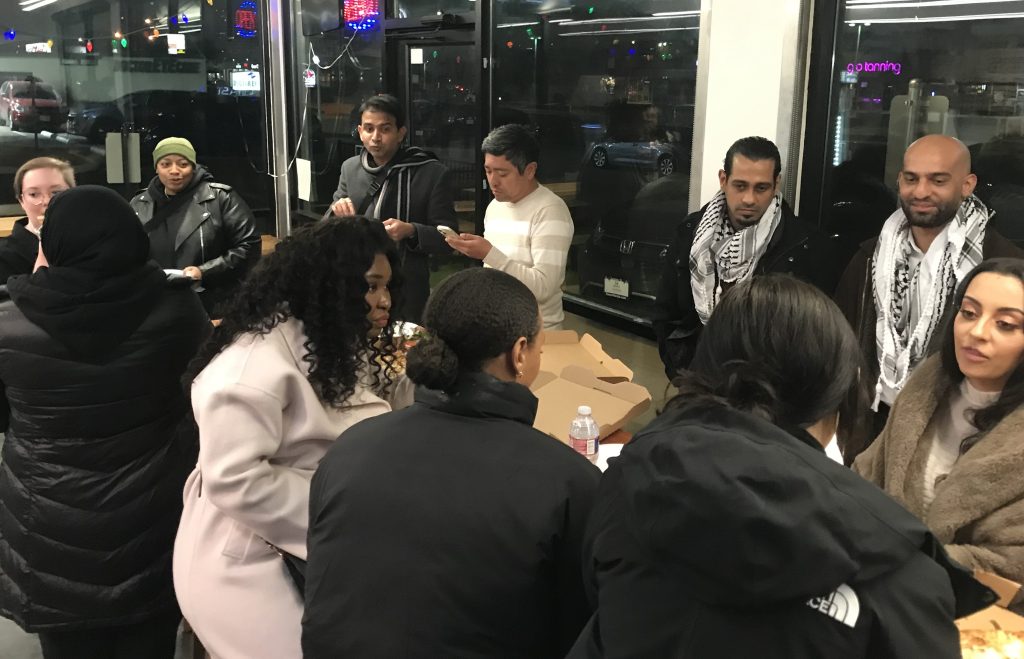
After the Kufiya Comedy show, crowd members and comics gather at Mondo’s Pizzeria on Lemmon Avenue. Comedian Spiller is in the green cap, David Diaz is checking his phone. Marena Riyad has her back to the camera. Jerome Weeks / KERA News
Plus, as an immigrant, she’s felt personally divided as well. Her memories split into two: before coming to America and after coming to America.
“Culture shock,” she said, “doesn’t even do it justice.”
Which is why she calls developing the Haus of Henna a “pivotal moment” for her. It brought together henna and stand-up, America and Palestine.
Perhaps as a result, perhaps because of her immigrant experience, Riyad is ambitious. Even driven. She found her calling, she knows these things can work. Now she wants to make a name for herself.
In the midst of all this — opening her salon, getting Kufiya Comedy underway — she also competed in the Miss Arab USA pageant last year. She didn’t win. But she’s producing and directing a documentary about her experiences with both the competition and the salon.
When asked what her business plan is for the henna salon now, Riyad replied Immediately: “Ten stores across the globe. And getting to the point when the stores and the comedy clubs are self-sustaining, they don’t need me anymore to run them.”
As for her mix of comedy and community, she and her producing partner, Alex Hanson, are making Kufiya Comedy a regular show — on the last Saturday of each month.
And this May, they’re planning a three-day comedy festival at different locations around Dallas, a different culture for each day.
And her dream gig? Hosting a late-night TV talk show.
She’s practicing now, she said. Building her audience — henna clients or comedy patrons. Getting them to relax. Getting them to laugh.
Kufiya Comedy, February 24, at the Haus of Henna, 4321 Lemmon Avenue.




